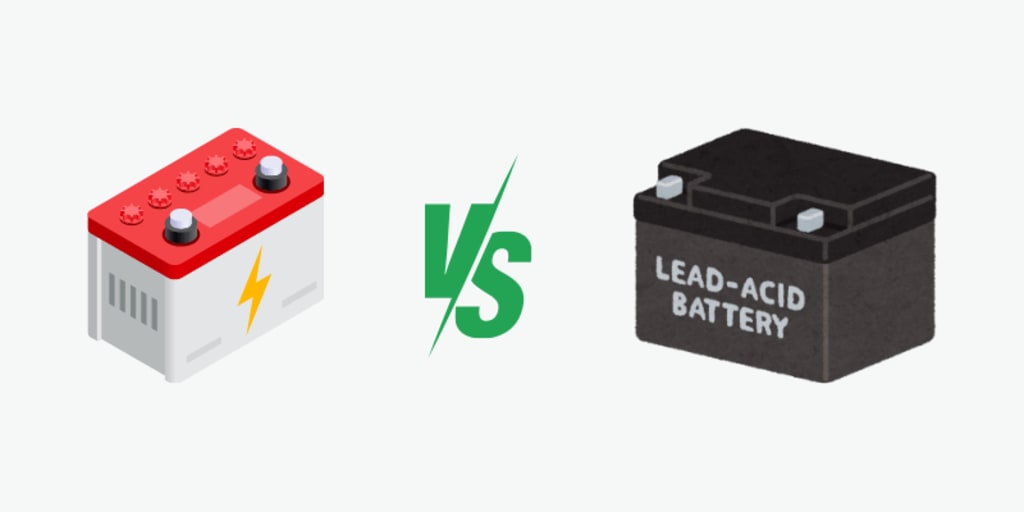Lithium Ion vs. Lead Acid Batteries
how to choose the right type based on your specific needs

Lithium ion and lead acid are two batteries which are most widely used. They serve different applications and have unique advantages and disadvantages.
So you need to know how to choose the right type based on your specific needs, this guide aims to simplify that choice.
Energy Density
A key distinction between the two battery types is their energy density, which measures how much energy can be stored in a given space.
Lithium-ion batteries offer approximately 120-180 Wh/kg, whereas lead-acid batteries typically provide between 28-40 Wh/kg.
Weight
Lithium Ion batteries are significantly lighter than their lead acid counterparts.
For instance, a typical li-ion battery can weigh up to 60% less. This weight reduction can be crucial in applications where mobility and portability are important.
Efficiency
When it comes to efficiency, lithium-ion batteries outperform lead acid batteries as well.
Lithium-ion batteries generally have a higher charge and discharge efficiency, often above 95%, while lead acid batteries range between 70-85%.
This makes lithium-ion batteries more suitable for applications requiring consistent power delivery and reliability.
Charging Time
Lithium Ion batteries are known for their fast charging capabilities. They can reach a full charge in just 3-5 hours, making them ideal for applications that require quick turnaround times.
Lead Acid batteries take significantly longer to charge. It can take anywhere from 6 to 12 hours to achieve a full charge, which can be a limiting factor in time-sensitive applications.
Discharge Rate and Depth
A battery’s depth of discharge measures how much of the battery can be drained without harming its cells.
During typical use, over 85% of a lithium phosphate battery's capacity is often used.
Lead acid batteries, however, should not discharge more than 50% of their capacity, as doing so can shorten their lifespan. This difference results in a significantly higher usable capacity for lithium-ion batteries.
High Temperature Performance
Lithium ion batteries perform well in high temperatures but have a threshold where performance degrades. Advanced thermal management is often needed to maintain optimal performance.
Lead acid batteries are more resilient, operating in extreme conditions without significant performance loss, ideal for harsh environments.
Cold Temperature Performance
Lithium ion batteries struggle in very cold conditions, with performance dropping significantly and sometimes needing special heating elements.
Lead acid batteries also face cold temperature challenges but are generally more robust, delivering adequate performance with minimal extra equipment.
Battery Lifespan
On average, a li-ion battery can last over 1,000 charge cycles.
In contrast, lead acid batteries can only last around 300 to 500 charge cycles.
While this might be sufficient for less demanding applications, it falls short in high-use scenarios. The shorter lifespan could mean more frequent replacements and higher long-term costs.
Storage
Lithium Ion batteries are easier to store. They have a low self-discharge rate, holding their charge longer without significant loss. They also need less maintenance.
Lead Acid batteries need more careful storage. They have a higher self-discharge rate and require regular maintenance checks to stay functional.
Cost
At first, Lithium Ion batteries cost more than Lead Acid batteries.
But, thanks to their longer lifespan and better performance, they can end up saving you money. Over time, the cost per cycle for Li-ion batteries becomes more economical.
Lead Acid batteries are cheaper upfront, which is great for budget-conscious buyers.
However, their shorter lifespan and frequent replacements can add up, making them possibly more expensive in the long run.
Conclusion
Choosing between Lithium Ion and Lead Acid batteries depends on your specific needs.
Lithium Ion batteries excel in lifespan, weight, power delivery, and installation ease, making them ideal for high-efficiency applications. Lead Acid batteries perform well in extreme temperatures and are cost-effective initially.
Understanding these differences helps you make informed decisions, ensuring you select the best battery for your needs.
About the Creator
Holo Battery
Holo Battery is a full service custom battery pack manufacturer with extensive experience with lithium ion and lifepo4 battery packs and assemblies.
Enjoyed the story? Support the Creator.
Subscribe for free to receive all their stories in your feed. You could also pledge your support or give them a one-off tip, letting them know you appreciate their work.






Comments
There are no comments for this story
Be the first to respond and start the conversation.